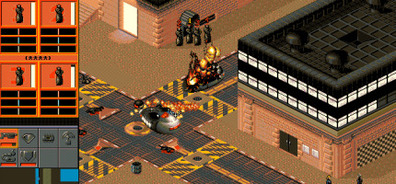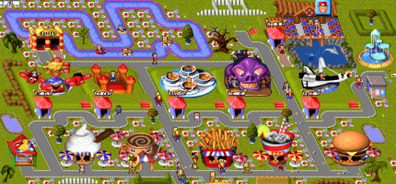Why it should have been Syndicate and Theme Park
April 9, 2010 | 13:59

As part of our Made in the UK week of games coverage, Joe put together a feature called The Best UK Games Ever. It was both well written and free from Deus Ex references, but that doesn't mean it was without flaws - as with any list feature we debated it around our desks for quite a while, but with no objective data, in the end, it's going to be a subjective piece. If you're going to go that route, then it's perhaps best to be wholly committed to it, and the list ought to represent one person's viewpoint - not a hodge-podge - and Joe acknowledged that's what we had, saying: "It’s telling as to the quality of Bullfrog’s games that the conversation was focused not on whether or not there were better games from other developers, but rather which Bullfrog game we should choose. Clive and Richard demanded Theme Hospital. Alex wanted Theme Park. James wanted Syndicate. But I’m writing this article and I wanted Dungeon Keeper. So, there."
What I'm saying is that Joe is wrong, but in the best possible way - so now I'm going to offer my reasoning as to why Theme Park and Syndicate should have made the list.
[break]
It's not that Dungeon Keeper is a bad game, but for me, it's the first of the later Bullfrog and Lionhead Games, the ones were I always had the feeling Molyneux and the team were reaching for concepts that were too complex - morality - and that, as a result, needed to be simplified in order to work in a game. This bastardization isn't anything like as bad as in BioShock, a game which literally presents you with a "BE EVIL: Y/N" option every time you encounter one of the Little Sisters, but Black & White and its ilk just don't get across the idea of good and evil in anything like a convincing manner.
In their earlier work, Bullfrog chose ideas that games could express perfectly and completely. Syndicate's idea is economics, specifically, the prioritisation of profit above all else - and for no other reason than the fact that with profit, the corporation can acquire more resources and more technology which are useful only for generating more profit.

In Syndicate you're the direct overlord of your team of four agents. They are the expression of your economic domination of the world, as you're able to upgrade both their kit and their bodies based on how successful your wider empire is. The only reason you need to upgrade them is so that you can be more effective at taking over more territories, in order to generate more money, in order to upgrade them once again. Neatly, the game also imposes another structure over this - you are a young executive within the company, and your success advances your own career.
There's a clear motive for players, and a clear system - to make it fun, there needs to be pressure and obstacles, and Syndicate has no shortage of harsh ways of competing against you. Missions are packed with tight timescales, enemies and the police, along with an adjustable drug supply for your agents. Using the drugs alters three key stats of your agents (intelligence, perception, adrenalin) but as in real life, hit the drugs too hard and there are consequences - so while you can speed your agents up, make them more lethal, their tolerances rise to the point that the drugs don't work.

Syndicate was released in 1993; a year later, Bullfrog followed it up with Theme Park, a game in which the team's move towards more complex concepts (and inevitable abstraction) is visible - however, the game is still perfectly balanced, and perfectly able to execute its ideas. The focus, once more, is economics, but this time, it's the idea of supply and demand. On the one hand, you might think this is a terribly boring idea for a game - but forget the specifics are you realise what you've got are two strong, clearly identifiable forces that must be balanced in order to succeed. All you need to do as a player is make that happen, and as a game designer, you just need to put objects in the way, and of course, economics has a built in system for limiting action: it's called money. Add the second limiting factor - customers - and you're away.
I remember being amazed at how in Theme Park you can think deviously and the game responds; you can lower the price of your park's fries, and then douse them in salt - creating thirsty customers - and then you whack the price of drinks up.
It's a testament to the strength and unity of the conceptual design and the code design that Theme Park could do away with the action, violence and explosions of Syndicate, and do away with direct control of any of the characters in the gameworld - and yet be more fun and more engaging. In my opinion, Bullfrog never again managed to so perfectly balance its love for interesting, intellectual concepts with involving, fun gameplay mechanics.
PS If you saw Tim's post yesterday, you know I'm the new editor of bit-tech! Hello there. I've been working behind the scenes on the site for over a year (and was a guest writer a couple of years before that). It's been a real pleasure so far - and there's lots more exciting stuff to come.
What I'm saying is that Joe is wrong, but in the best possible way - so now I'm going to offer my reasoning as to why Theme Park and Syndicate should have made the list.
[break]
It's not that Dungeon Keeper is a bad game, but for me, it's the first of the later Bullfrog and Lionhead Games, the ones were I always had the feeling Molyneux and the team were reaching for concepts that were too complex - morality - and that, as a result, needed to be simplified in order to work in a game. This bastardization isn't anything like as bad as in BioShock, a game which literally presents you with a "BE EVIL: Y/N" option every time you encounter one of the Little Sisters, but Black & White and its ilk just don't get across the idea of good and evil in anything like a convincing manner.
In their earlier work, Bullfrog chose ideas that games could express perfectly and completely. Syndicate's idea is economics, specifically, the prioritisation of profit above all else - and for no other reason than the fact that with profit, the corporation can acquire more resources and more technology which are useful only for generating more profit.

In Syndicate you're the direct overlord of your team of four agents. They are the expression of your economic domination of the world, as you're able to upgrade both their kit and their bodies based on how successful your wider empire is. The only reason you need to upgrade them is so that you can be more effective at taking over more territories, in order to generate more money, in order to upgrade them once again. Neatly, the game also imposes another structure over this - you are a young executive within the company, and your success advances your own career.
There's a clear motive for players, and a clear system - to make it fun, there needs to be pressure and obstacles, and Syndicate has no shortage of harsh ways of competing against you. Missions are packed with tight timescales, enemies and the police, along with an adjustable drug supply for your agents. Using the drugs alters three key stats of your agents (intelligence, perception, adrenalin) but as in real life, hit the drugs too hard and there are consequences - so while you can speed your agents up, make them more lethal, their tolerances rise to the point that the drugs don't work.

Syndicate was released in 1993; a year later, Bullfrog followed it up with Theme Park, a game in which the team's move towards more complex concepts (and inevitable abstraction) is visible - however, the game is still perfectly balanced, and perfectly able to execute its ideas. The focus, once more, is economics, but this time, it's the idea of supply and demand. On the one hand, you might think this is a terribly boring idea for a game - but forget the specifics are you realise what you've got are two strong, clearly identifiable forces that must be balanced in order to succeed. All you need to do as a player is make that happen, and as a game designer, you just need to put objects in the way, and of course, economics has a built in system for limiting action: it's called money. Add the second limiting factor - customers - and you're away.
I remember being amazed at how in Theme Park you can think deviously and the game responds; you can lower the price of your park's fries, and then douse them in salt - creating thirsty customers - and then you whack the price of drinks up.
It's a testament to the strength and unity of the conceptual design and the code design that Theme Park could do away with the action, violence and explosions of Syndicate, and do away with direct control of any of the characters in the gameworld - and yet be more fun and more engaging. In my opinion, Bullfrog never again managed to so perfectly balance its love for interesting, intellectual concepts with involving, fun gameplay mechanics.
PS If you saw Tim's post yesterday, you know I'm the new editor of bit-tech! Hello there. I've been working behind the scenes on the site for over a year (and was a guest writer a couple of years before that). It's been a real pleasure so far - and there's lots more exciting stuff to come.

MSI MPG Velox 100R Chassis Review
October 14 2021 | 15:04






Want to comment? Please log in.